Social Workers and Community Welfare Workers Making a Difference
VerifiedAdded on 2023/06/10
|7
|2142
|126
AI Summary
This article discusses the role of social and community welfare workers in Australia and their focus on the development of the countrymen who are in need of their services. It also explores the skills required to work with refugees and aboriginal and Torres Strait Islander communities, and the challenges faced by these communities. The article concludes with a discussion of the policies and programs needed to improve the condition of these communities.
Contribute Materials
Your contribution can guide someone’s learning journey. Share your
documents today.
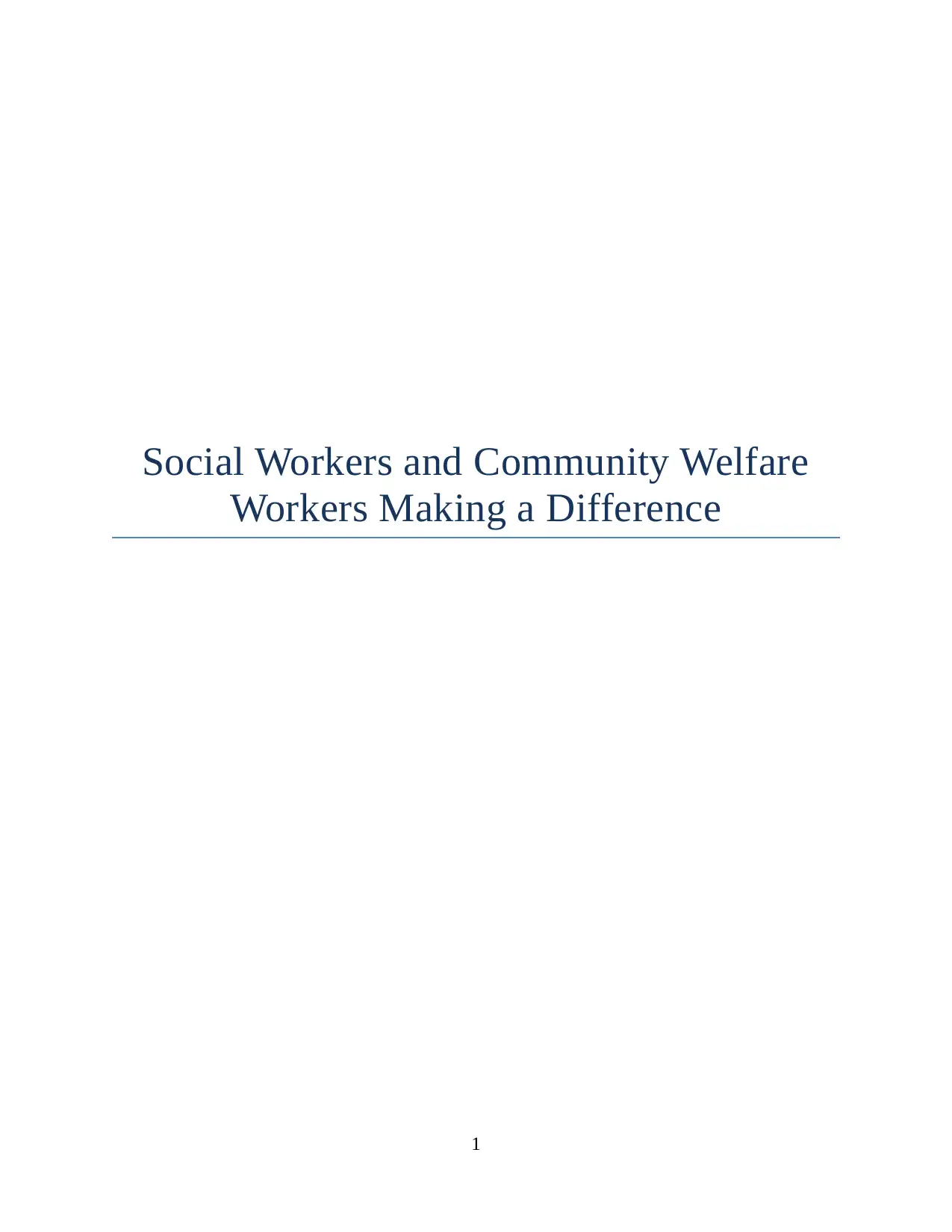
Social Workers and Community Welfare
Workers Making a Difference
1
Workers Making a Difference
1
Secure Best Marks with AI Grader
Need help grading? Try our AI Grader for instant feedback on your assignments.
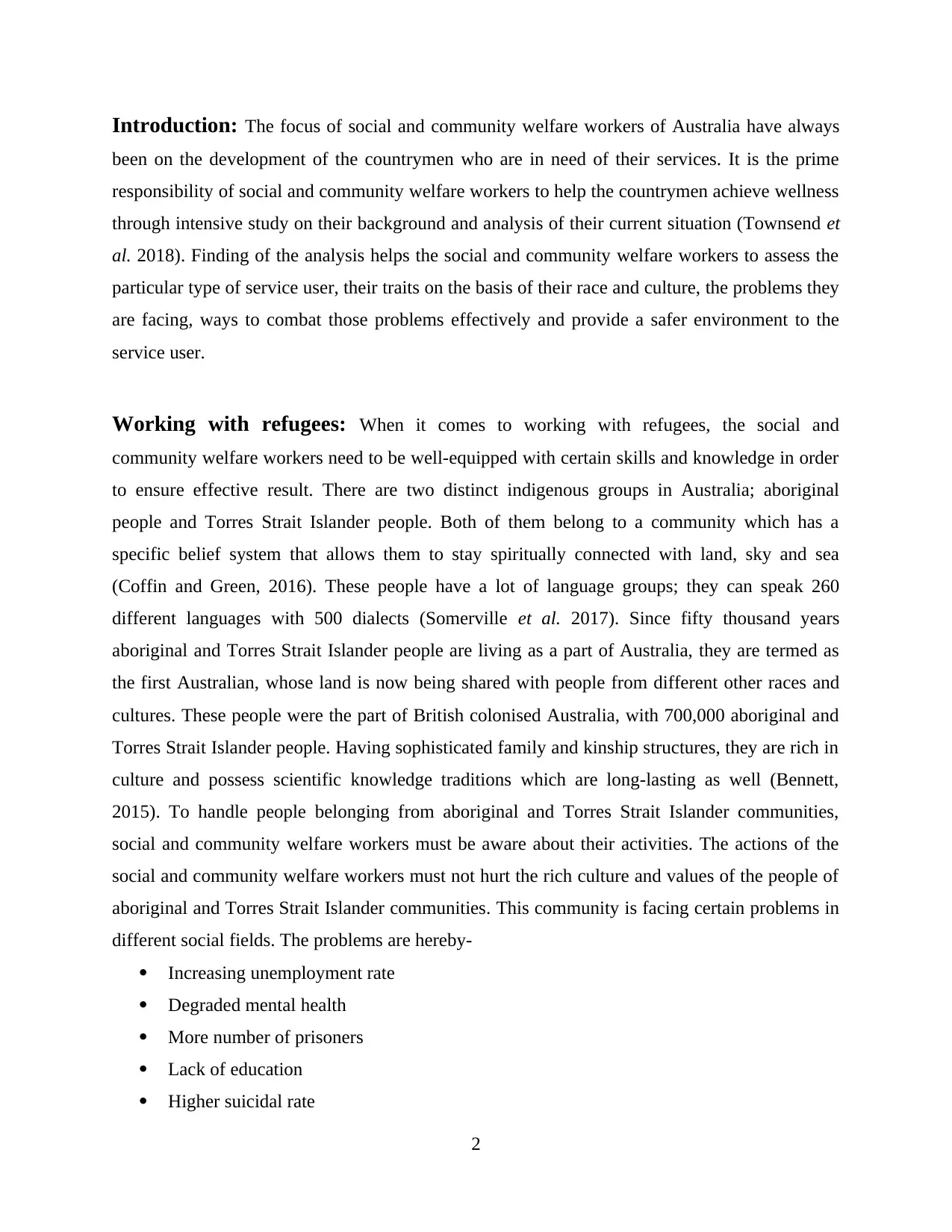
Introduction: The focus of social and community welfare workers of Australia have always
been on the development of the countrymen who are in need of their services. It is the prime
responsibility of social and community welfare workers to help the countrymen achieve wellness
through intensive study on their background and analysis of their current situation (Townsend et
al. 2018). Finding of the analysis helps the social and community welfare workers to assess the
particular type of service user, their traits on the basis of their race and culture, the problems they
are facing, ways to combat those problems effectively and provide a safer environment to the
service user.
Working with refugees: When it comes to working with refugees, the social and
community welfare workers need to be well-equipped with certain skills and knowledge in order
to ensure effective result. There are two distinct indigenous groups in Australia; aboriginal
people and Torres Strait Islander people. Both of them belong to a community which has a
specific belief system that allows them to stay spiritually connected with land, sky and sea
(Coffin and Green, 2016). These people have a lot of language groups; they can speak 260
different languages with 500 dialects (Somerville et al. 2017). Since fifty thousand years
aboriginal and Torres Strait Islander people are living as a part of Australia, they are termed as
the first Australian, whose land is now being shared with people from different other races and
cultures. These people were the part of British colonised Australia, with 700,000 aboriginal and
Torres Strait Islander people. Having sophisticated family and kinship structures, they are rich in
culture and possess scientific knowledge traditions which are long-lasting as well (Bennett,
2015). To handle people belonging from aboriginal and Torres Strait Islander communities,
social and community welfare workers must be aware about their activities. The actions of the
social and community welfare workers must not hurt the rich culture and values of the people of
aboriginal and Torres Strait Islander communities. This community is facing certain problems in
different social fields. The problems are hereby-
Increasing unemployment rate
Degraded mental health
More number of prisoners
Lack of education
Higher suicidal rate
2
been on the development of the countrymen who are in need of their services. It is the prime
responsibility of social and community welfare workers to help the countrymen achieve wellness
through intensive study on their background and analysis of their current situation (Townsend et
al. 2018). Finding of the analysis helps the social and community welfare workers to assess the
particular type of service user, their traits on the basis of their race and culture, the problems they
are facing, ways to combat those problems effectively and provide a safer environment to the
service user.
Working with refugees: When it comes to working with refugees, the social and
community welfare workers need to be well-equipped with certain skills and knowledge in order
to ensure effective result. There are two distinct indigenous groups in Australia; aboriginal
people and Torres Strait Islander people. Both of them belong to a community which has a
specific belief system that allows them to stay spiritually connected with land, sky and sea
(Coffin and Green, 2016). These people have a lot of language groups; they can speak 260
different languages with 500 dialects (Somerville et al. 2017). Since fifty thousand years
aboriginal and Torres Strait Islander people are living as a part of Australia, they are termed as
the first Australian, whose land is now being shared with people from different other races and
cultures. These people were the part of British colonised Australia, with 700,000 aboriginal and
Torres Strait Islander people. Having sophisticated family and kinship structures, they are rich in
culture and possess scientific knowledge traditions which are long-lasting as well (Bennett,
2015). To handle people belonging from aboriginal and Torres Strait Islander communities,
social and community welfare workers must be aware about their activities. The actions of the
social and community welfare workers must not hurt the rich culture and values of the people of
aboriginal and Torres Strait Islander communities. This community is facing certain problems in
different social fields. The problems are hereby-
Increasing unemployment rate
Degraded mental health
More number of prisoners
Lack of education
Higher suicidal rate
2
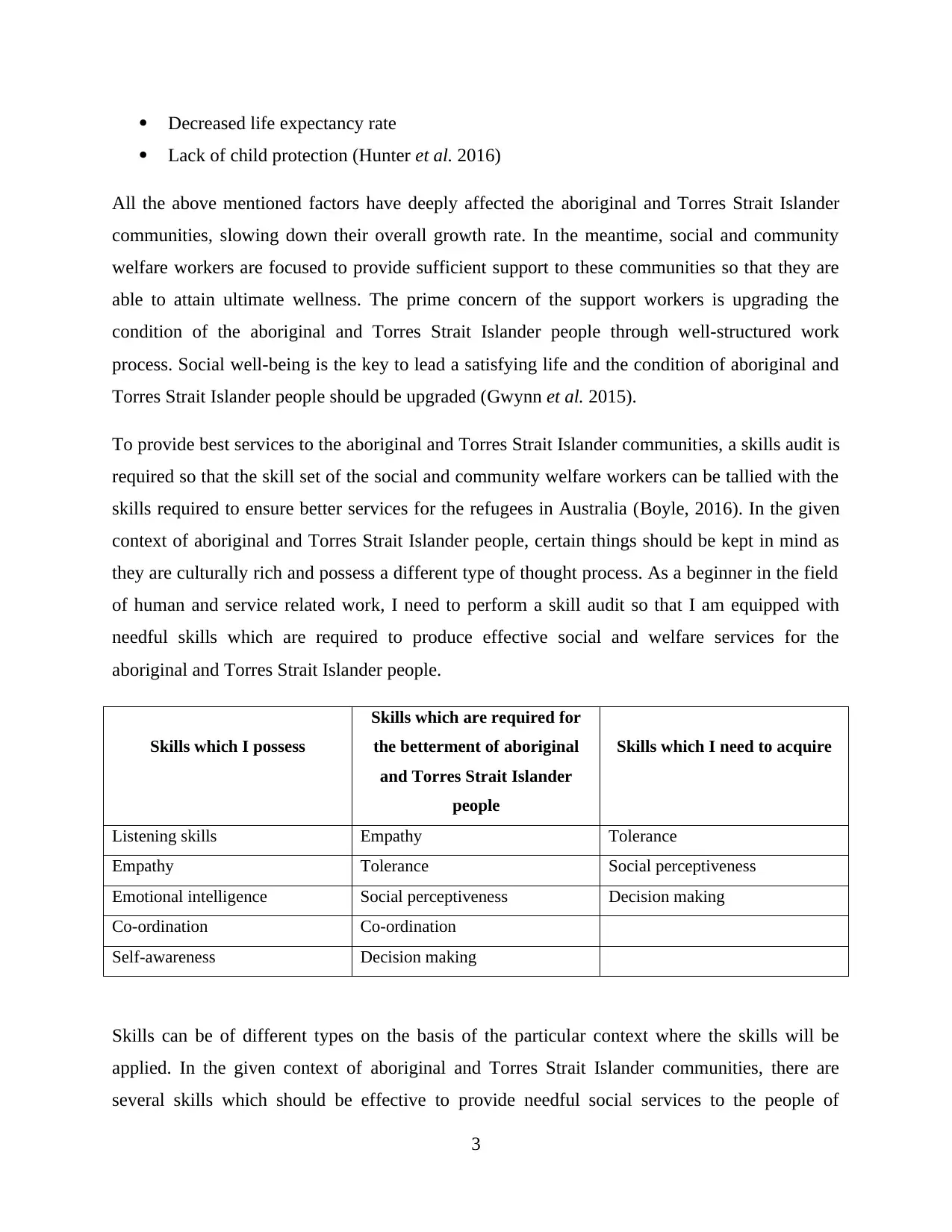
Decreased life expectancy rate
Lack of child protection (Hunter et al. 2016)
All the above mentioned factors have deeply affected the aboriginal and Torres Strait Islander
communities, slowing down their overall growth rate. In the meantime, social and community
welfare workers are focused to provide sufficient support to these communities so that they are
able to attain ultimate wellness. The prime concern of the support workers is upgrading the
condition of the aboriginal and Torres Strait Islander people through well-structured work
process. Social well-being is the key to lead a satisfying life and the condition of aboriginal and
Torres Strait Islander people should be upgraded (Gwynn et al. 2015).
To provide best services to the aboriginal and Torres Strait Islander communities, a skills audit is
required so that the skill set of the social and community welfare workers can be tallied with the
skills required to ensure better services for the refugees in Australia (Boyle, 2016). In the given
context of aboriginal and Torres Strait Islander people, certain things should be kept in mind as
they are culturally rich and possess a different type of thought process. As a beginner in the field
of human and service related work, I need to perform a skill audit so that I am equipped with
needful skills which are required to produce effective social and welfare services for the
aboriginal and Torres Strait Islander people.
Skills which I possess
Skills which are required for
the betterment of aboriginal
and Torres Strait Islander
people
Skills which I need to acquire
Listening skills Empathy Tolerance
Empathy Tolerance Social perceptiveness
Emotional intelligence Social perceptiveness Decision making
Co-ordination Co-ordination
Self-awareness Decision making
Skills can be of different types on the basis of the particular context where the skills will be
applied. In the given context of aboriginal and Torres Strait Islander communities, there are
several skills which should be effective to provide needful social services to the people of
3
Lack of child protection (Hunter et al. 2016)
All the above mentioned factors have deeply affected the aboriginal and Torres Strait Islander
communities, slowing down their overall growth rate. In the meantime, social and community
welfare workers are focused to provide sufficient support to these communities so that they are
able to attain ultimate wellness. The prime concern of the support workers is upgrading the
condition of the aboriginal and Torres Strait Islander people through well-structured work
process. Social well-being is the key to lead a satisfying life and the condition of aboriginal and
Torres Strait Islander people should be upgraded (Gwynn et al. 2015).
To provide best services to the aboriginal and Torres Strait Islander communities, a skills audit is
required so that the skill set of the social and community welfare workers can be tallied with the
skills required to ensure better services for the refugees in Australia (Boyle, 2016). In the given
context of aboriginal and Torres Strait Islander people, certain things should be kept in mind as
they are culturally rich and possess a different type of thought process. As a beginner in the field
of human and service related work, I need to perform a skill audit so that I am equipped with
needful skills which are required to produce effective social and welfare services for the
aboriginal and Torres Strait Islander people.
Skills which I possess
Skills which are required for
the betterment of aboriginal
and Torres Strait Islander
people
Skills which I need to acquire
Listening skills Empathy Tolerance
Empathy Tolerance Social perceptiveness
Emotional intelligence Social perceptiveness Decision making
Co-ordination Co-ordination
Self-awareness Decision making
Skills can be of different types on the basis of the particular context where the skills will be
applied. In the given context of aboriginal and Torres Strait Islander communities, there are
several skills which should be effective to provide needful social services to the people of
3
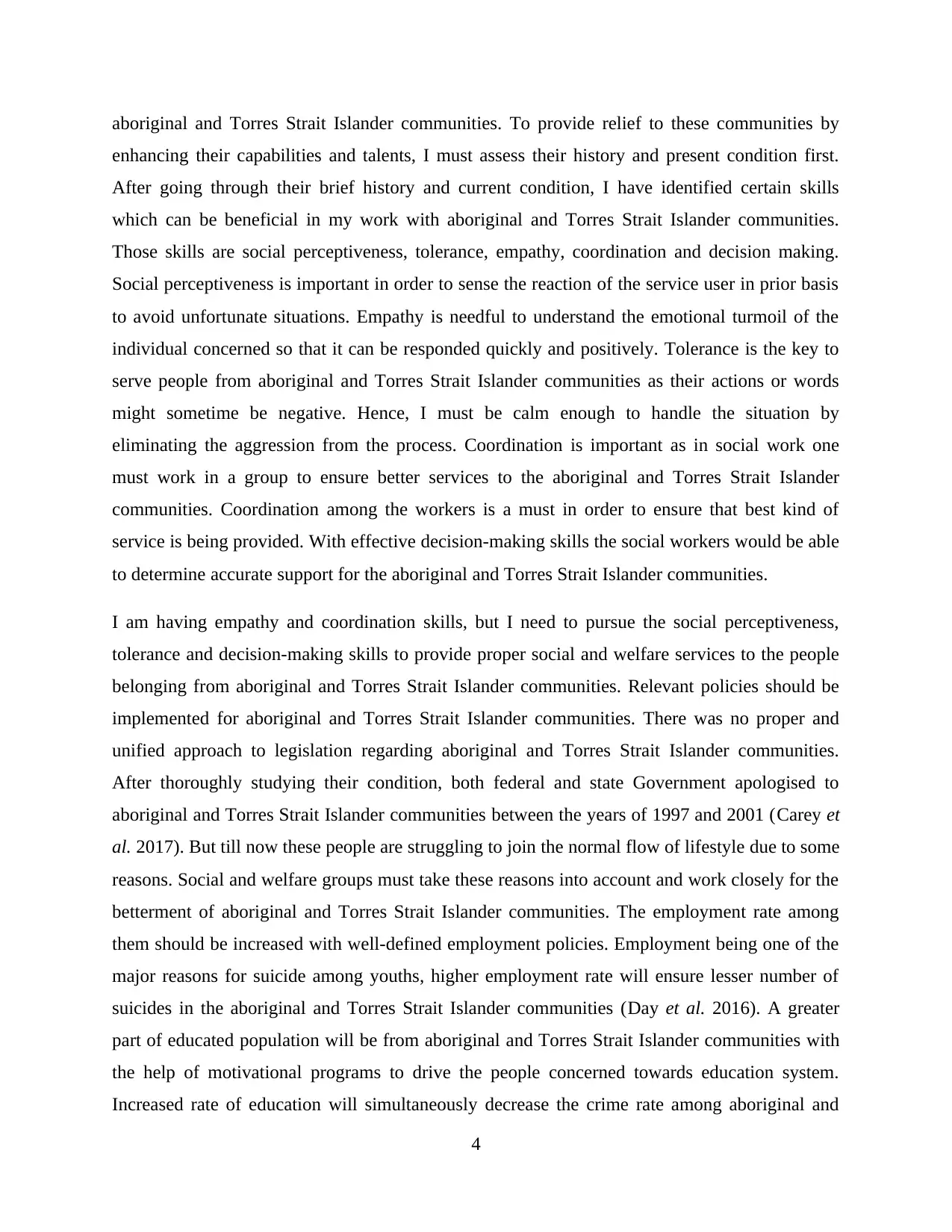
aboriginal and Torres Strait Islander communities. To provide relief to these communities by
enhancing their capabilities and talents, I must assess their history and present condition first.
After going through their brief history and current condition, I have identified certain skills
which can be beneficial in my work with aboriginal and Torres Strait Islander communities.
Those skills are social perceptiveness, tolerance, empathy, coordination and decision making.
Social perceptiveness is important in order to sense the reaction of the service user in prior basis
to avoid unfortunate situations. Empathy is needful to understand the emotional turmoil of the
individual concerned so that it can be responded quickly and positively. Tolerance is the key to
serve people from aboriginal and Torres Strait Islander communities as their actions or words
might sometime be negative. Hence, I must be calm enough to handle the situation by
eliminating the aggression from the process. Coordination is important as in social work one
must work in a group to ensure better services to the aboriginal and Torres Strait Islander
communities. Coordination among the workers is a must in order to ensure that best kind of
service is being provided. With effective decision-making skills the social workers would be able
to determine accurate support for the aboriginal and Torres Strait Islander communities.
I am having empathy and coordination skills, but I need to pursue the social perceptiveness,
tolerance and decision-making skills to provide proper social and welfare services to the people
belonging from aboriginal and Torres Strait Islander communities. Relevant policies should be
implemented for aboriginal and Torres Strait Islander communities. There was no proper and
unified approach to legislation regarding aboriginal and Torres Strait Islander communities.
After thoroughly studying their condition, both federal and state Government apologised to
aboriginal and Torres Strait Islander communities between the years of 1997 and 2001 (Carey et
al. 2017). But till now these people are struggling to join the normal flow of lifestyle due to some
reasons. Social and welfare groups must take these reasons into account and work closely for the
betterment of aboriginal and Torres Strait Islander communities. The employment rate among
them should be increased with well-defined employment policies. Employment being one of the
major reasons for suicide among youths, higher employment rate will ensure lesser number of
suicides in the aboriginal and Torres Strait Islander communities (Day et al. 2016). A greater
part of educated population will be from aboriginal and Torres Strait Islander communities with
the help of motivational programs to drive the people concerned towards education system.
Increased rate of education will simultaneously decrease the crime rate among aboriginal and
4
enhancing their capabilities and talents, I must assess their history and present condition first.
After going through their brief history and current condition, I have identified certain skills
which can be beneficial in my work with aboriginal and Torres Strait Islander communities.
Those skills are social perceptiveness, tolerance, empathy, coordination and decision making.
Social perceptiveness is important in order to sense the reaction of the service user in prior basis
to avoid unfortunate situations. Empathy is needful to understand the emotional turmoil of the
individual concerned so that it can be responded quickly and positively. Tolerance is the key to
serve people from aboriginal and Torres Strait Islander communities as their actions or words
might sometime be negative. Hence, I must be calm enough to handle the situation by
eliminating the aggression from the process. Coordination is important as in social work one
must work in a group to ensure better services to the aboriginal and Torres Strait Islander
communities. Coordination among the workers is a must in order to ensure that best kind of
service is being provided. With effective decision-making skills the social workers would be able
to determine accurate support for the aboriginal and Torres Strait Islander communities.
I am having empathy and coordination skills, but I need to pursue the social perceptiveness,
tolerance and decision-making skills to provide proper social and welfare services to the people
belonging from aboriginal and Torres Strait Islander communities. Relevant policies should be
implemented for aboriginal and Torres Strait Islander communities. There was no proper and
unified approach to legislation regarding aboriginal and Torres Strait Islander communities.
After thoroughly studying their condition, both federal and state Government apologised to
aboriginal and Torres Strait Islander communities between the years of 1997 and 2001 (Carey et
al. 2017). But till now these people are struggling to join the normal flow of lifestyle due to some
reasons. Social and welfare groups must take these reasons into account and work closely for the
betterment of aboriginal and Torres Strait Islander communities. The employment rate among
them should be increased with well-defined employment policies. Employment being one of the
major reasons for suicide among youths, higher employment rate will ensure lesser number of
suicides in the aboriginal and Torres Strait Islander communities (Day et al. 2016). A greater
part of educated population will be from aboriginal and Torres Strait Islander communities with
the help of motivational programs to drive the people concerned towards education system.
Increased rate of education will simultaneously decrease the crime rate among aboriginal and
4
Secure Best Marks with AI Grader
Need help grading? Try our AI Grader for instant feedback on your assignments.
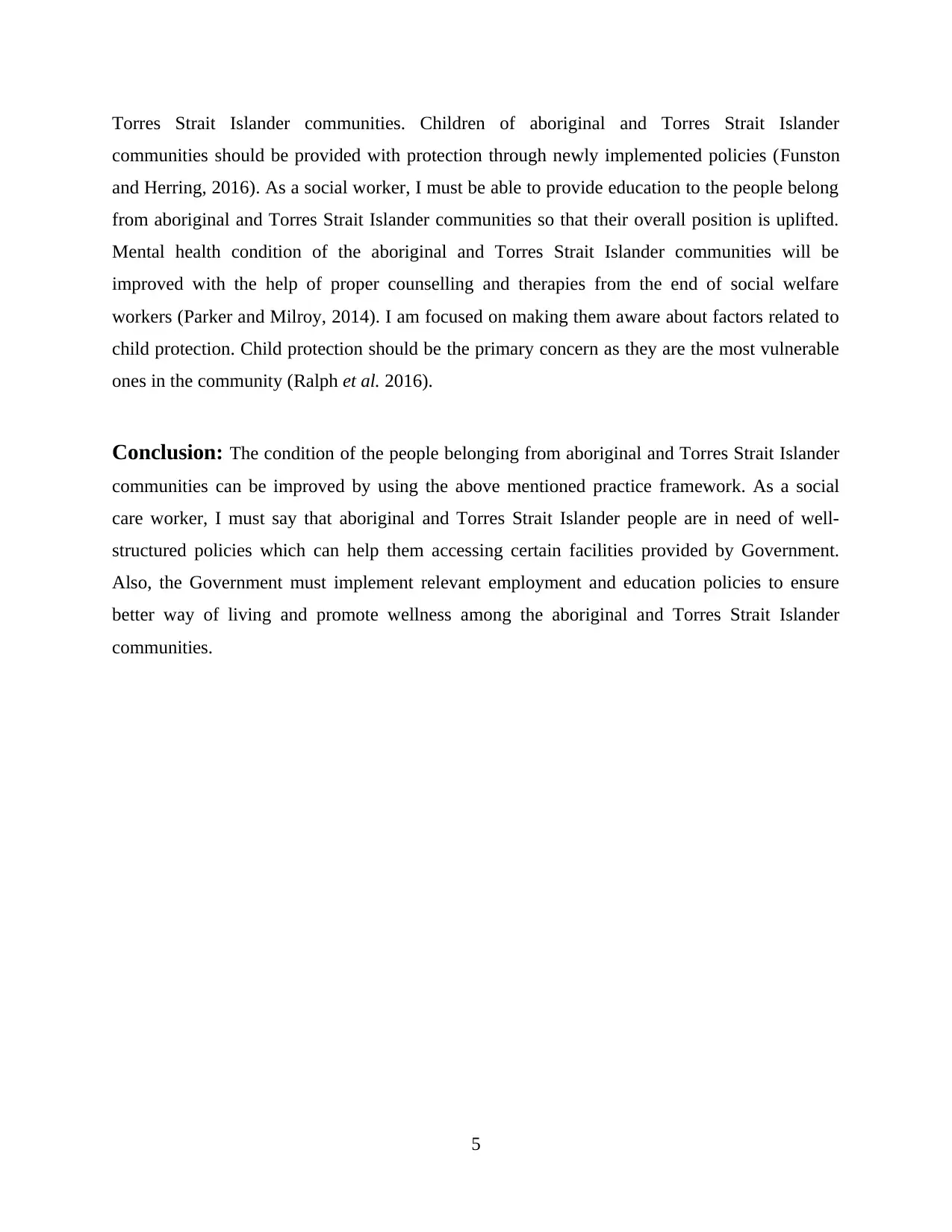
Torres Strait Islander communities. Children of aboriginal and Torres Strait Islander
communities should be provided with protection through newly implemented policies (Funston
and Herring, 2016). As a social worker, I must be able to provide education to the people belong
from aboriginal and Torres Strait Islander communities so that their overall position is uplifted.
Mental health condition of the aboriginal and Torres Strait Islander communities will be
improved with the help of proper counselling and therapies from the end of social welfare
workers (Parker and Milroy, 2014). I am focused on making them aware about factors related to
child protection. Child protection should be the primary concern as they are the most vulnerable
ones in the community (Ralph et al. 2016).
Conclusion: The condition of the people belonging from aboriginal and Torres Strait Islander
communities can be improved by using the above mentioned practice framework. As a social
care worker, I must say that aboriginal and Torres Strait Islander people are in need of well-
structured policies which can help them accessing certain facilities provided by Government.
Also, the Government must implement relevant employment and education policies to ensure
better way of living and promote wellness among the aboriginal and Torres Strait Islander
communities.
5
communities should be provided with protection through newly implemented policies (Funston
and Herring, 2016). As a social worker, I must be able to provide education to the people belong
from aboriginal and Torres Strait Islander communities so that their overall position is uplifted.
Mental health condition of the aboriginal and Torres Strait Islander communities will be
improved with the help of proper counselling and therapies from the end of social welfare
workers (Parker and Milroy, 2014). I am focused on making them aware about factors related to
child protection. Child protection should be the primary concern as they are the most vulnerable
ones in the community (Ralph et al. 2016).
Conclusion: The condition of the people belonging from aboriginal and Torres Strait Islander
communities can be improved by using the above mentioned practice framework. As a social
care worker, I must say that aboriginal and Torres Strait Islander people are in need of well-
structured policies which can help them accessing certain facilities provided by Government.
Also, the Government must implement relevant employment and education policies to ensure
better way of living and promote wellness among the aboriginal and Torres Strait Islander
communities.
5
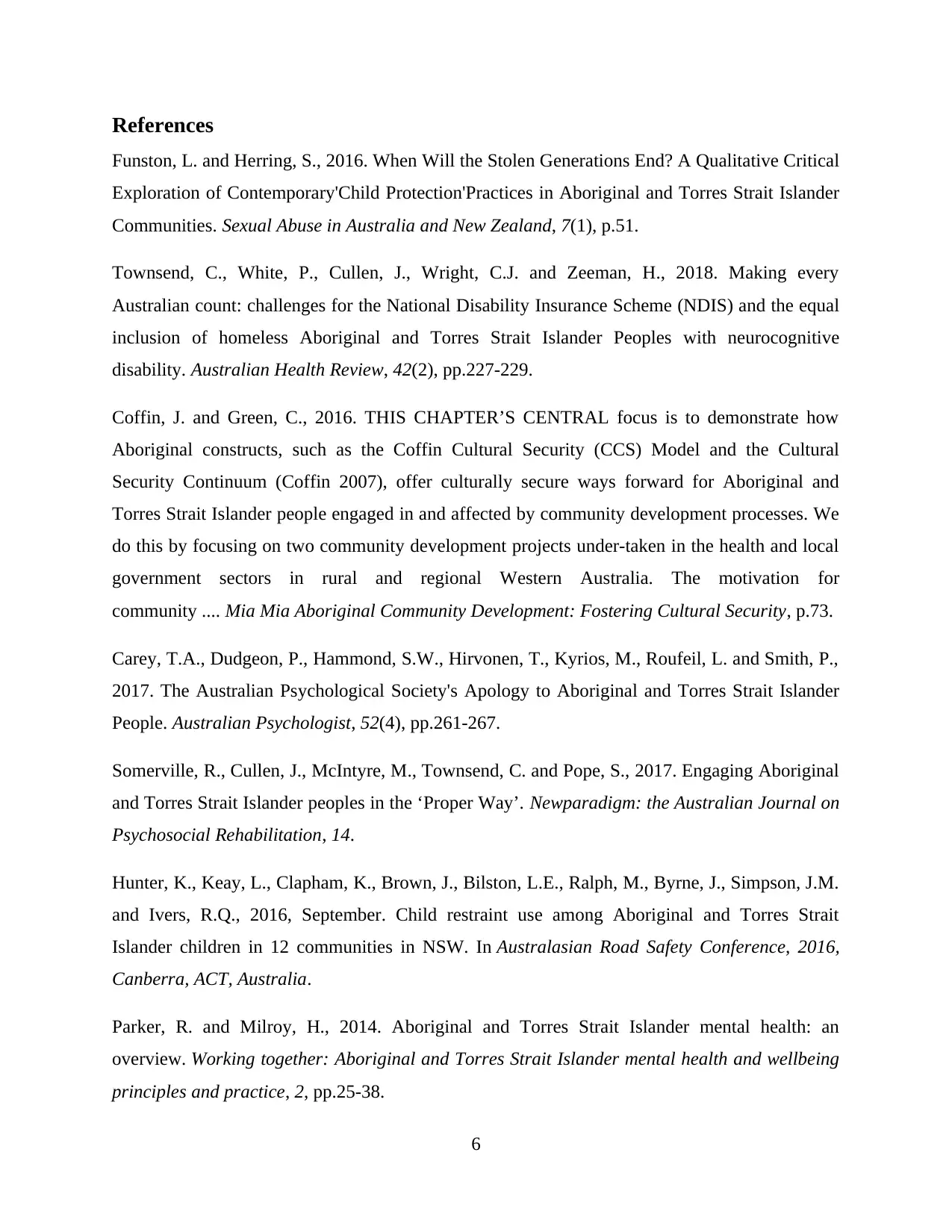
References
Funston, L. and Herring, S., 2016. When Will the Stolen Generations End? A Qualitative Critical
Exploration of Contemporary'Child Protection'Practices in Aboriginal and Torres Strait Islander
Communities. Sexual Abuse in Australia and New Zealand, 7(1), p.51.
Townsend, C., White, P., Cullen, J., Wright, C.J. and Zeeman, H., 2018. Making every
Australian count: challenges for the National Disability Insurance Scheme (NDIS) and the equal
inclusion of homeless Aboriginal and Torres Strait Islander Peoples with neurocognitive
disability. Australian Health Review, 42(2), pp.227-229.
Coffin, J. and Green, C., 2016. THIS CHAPTER’S CENTRAL focus is to demonstrate how
Aboriginal constructs, such as the Coffin Cultural Security (CCS) Model and the Cultural
Security Continuum (Coffin 2007), offer culturally secure ways forward for Aboriginal and
Torres Strait Islander people engaged in and affected by community development processes. We
do this by focusing on two community development projects under-taken in the health and local
government sectors in rural and regional Western Australia. The motivation for
community .... Mia Mia Aboriginal Community Development: Fostering Cultural Security, p.73.
Carey, T.A., Dudgeon, P., Hammond, S.W., Hirvonen, T., Kyrios, M., Roufeil, L. and Smith, P.,
2017. The Australian Psychological Society's Apology to Aboriginal and Torres Strait Islander
People. Australian Psychologist, 52(4), pp.261-267.
Somerville, R., Cullen, J., McIntyre, M., Townsend, C. and Pope, S., 2017. Engaging Aboriginal
and Torres Strait Islander peoples in the ‘Proper Way’. Newparadigm: the Australian Journal on
Psychosocial Rehabilitation, 14.
Hunter, K., Keay, L., Clapham, K., Brown, J., Bilston, L.E., Ralph, M., Byrne, J., Simpson, J.M.
and Ivers, R.Q., 2016, September. Child restraint use among Aboriginal and Torres Strait
Islander children in 12 communities in NSW. In Australasian Road Safety Conference, 2016,
Canberra, ACT, Australia.
Parker, R. and Milroy, H., 2014. Aboriginal and Torres Strait Islander mental health: an
overview. Working together: Aboriginal and Torres Strait Islander mental health and wellbeing
principles and practice, 2, pp.25-38.
6
Funston, L. and Herring, S., 2016. When Will the Stolen Generations End? A Qualitative Critical
Exploration of Contemporary'Child Protection'Practices in Aboriginal and Torres Strait Islander
Communities. Sexual Abuse in Australia and New Zealand, 7(1), p.51.
Townsend, C., White, P., Cullen, J., Wright, C.J. and Zeeman, H., 2018. Making every
Australian count: challenges for the National Disability Insurance Scheme (NDIS) and the equal
inclusion of homeless Aboriginal and Torres Strait Islander Peoples with neurocognitive
disability. Australian Health Review, 42(2), pp.227-229.
Coffin, J. and Green, C., 2016. THIS CHAPTER’S CENTRAL focus is to demonstrate how
Aboriginal constructs, such as the Coffin Cultural Security (CCS) Model and the Cultural
Security Continuum (Coffin 2007), offer culturally secure ways forward for Aboriginal and
Torres Strait Islander people engaged in and affected by community development processes. We
do this by focusing on two community development projects under-taken in the health and local
government sectors in rural and regional Western Australia. The motivation for
community .... Mia Mia Aboriginal Community Development: Fostering Cultural Security, p.73.
Carey, T.A., Dudgeon, P., Hammond, S.W., Hirvonen, T., Kyrios, M., Roufeil, L. and Smith, P.,
2017. The Australian Psychological Society's Apology to Aboriginal and Torres Strait Islander
People. Australian Psychologist, 52(4), pp.261-267.
Somerville, R., Cullen, J., McIntyre, M., Townsend, C. and Pope, S., 2017. Engaging Aboriginal
and Torres Strait Islander peoples in the ‘Proper Way’. Newparadigm: the Australian Journal on
Psychosocial Rehabilitation, 14.
Hunter, K., Keay, L., Clapham, K., Brown, J., Bilston, L.E., Ralph, M., Byrne, J., Simpson, J.M.
and Ivers, R.Q., 2016, September. Child restraint use among Aboriginal and Torres Strait
Islander children in 12 communities in NSW. In Australasian Road Safety Conference, 2016,
Canberra, ACT, Australia.
Parker, R. and Milroy, H., 2014. Aboriginal and Torres Strait Islander mental health: an
overview. Working together: Aboriginal and Torres Strait Islander mental health and wellbeing
principles and practice, 2, pp.25-38.
6
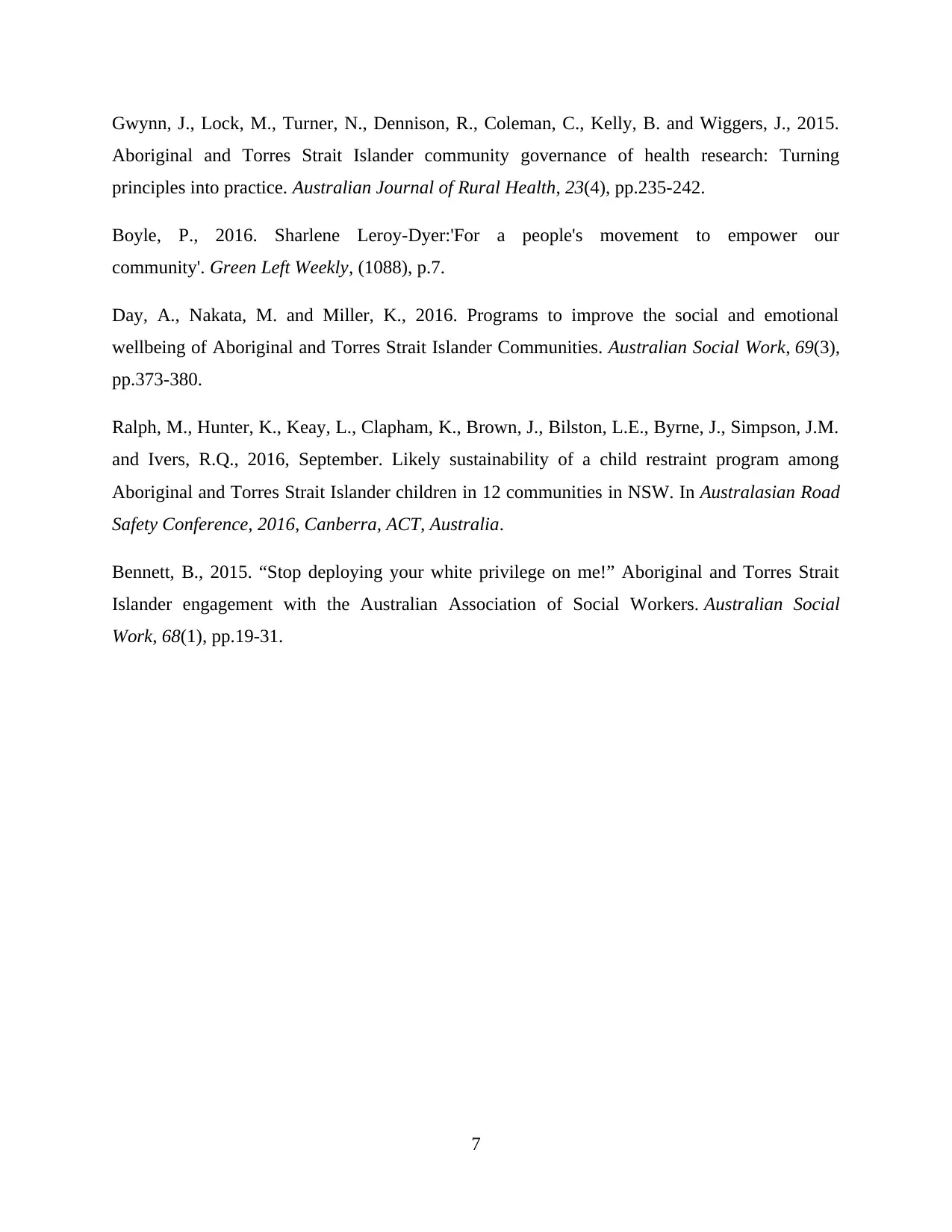
Gwynn, J., Lock, M., Turner, N., Dennison, R., Coleman, C., Kelly, B. and Wiggers, J., 2015.
Aboriginal and Torres Strait Islander community governance of health research: Turning
principles into practice. Australian Journal of Rural Health, 23(4), pp.235-242.
Boyle, P., 2016. Sharlene Leroy-Dyer:'For a people's movement to empower our
community'. Green Left Weekly, (1088), p.7.
Day, A., Nakata, M. and Miller, K., 2016. Programs to improve the social and emotional
wellbeing of Aboriginal and Torres Strait Islander Communities. Australian Social Work, 69(3),
pp.373-380.
Ralph, M., Hunter, K., Keay, L., Clapham, K., Brown, J., Bilston, L.E., Byrne, J., Simpson, J.M.
and Ivers, R.Q., 2016, September. Likely sustainability of a child restraint program among
Aboriginal and Torres Strait Islander children in 12 communities in NSW. In Australasian Road
Safety Conference, 2016, Canberra, ACT, Australia.
Bennett, B., 2015. “Stop deploying your white privilege on me!” Aboriginal and Torres Strait
Islander engagement with the Australian Association of Social Workers. Australian Social
Work, 68(1), pp.19-31.
7
Aboriginal and Torres Strait Islander community governance of health research: Turning
principles into practice. Australian Journal of Rural Health, 23(4), pp.235-242.
Boyle, P., 2016. Sharlene Leroy-Dyer:'For a people's movement to empower our
community'. Green Left Weekly, (1088), p.7.
Day, A., Nakata, M. and Miller, K., 2016. Programs to improve the social and emotional
wellbeing of Aboriginal and Torres Strait Islander Communities. Australian Social Work, 69(3),
pp.373-380.
Ralph, M., Hunter, K., Keay, L., Clapham, K., Brown, J., Bilston, L.E., Byrne, J., Simpson, J.M.
and Ivers, R.Q., 2016, September. Likely sustainability of a child restraint program among
Aboriginal and Torres Strait Islander children in 12 communities in NSW. In Australasian Road
Safety Conference, 2016, Canberra, ACT, Australia.
Bennett, B., 2015. “Stop deploying your white privilege on me!” Aboriginal and Torres Strait
Islander engagement with the Australian Association of Social Workers. Australian Social
Work, 68(1), pp.19-31.
7
1 out of 7
Related Documents
Your All-in-One AI-Powered Toolkit for Academic Success.
+13062052269
info@desklib.com
Available 24*7 on WhatsApp / Email
![[object Object]](/_next/static/media/star-bottom.7253800d.svg)
Unlock your academic potential
© 2024 | Zucol Services PVT LTD | All rights reserved.




